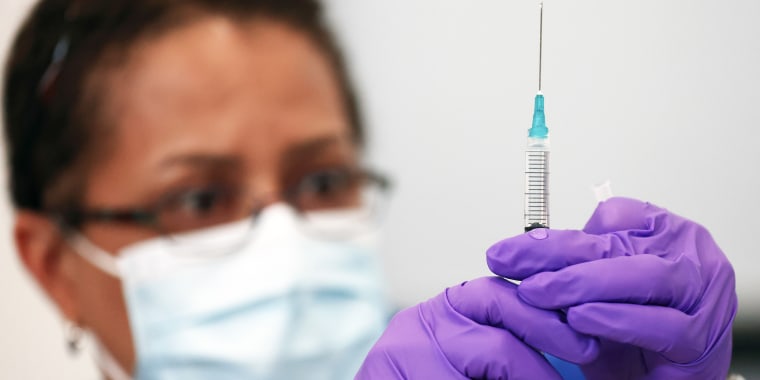The Food and Drug Administration amended the emergency use authorizations for the Moderna and the Pfizer-BioNTech COVID-19 vaccines Thursday to allow some people with compromised immune systems to get a third dose.
The change in FDA regulation is specific to patients who have been unable to mount an adequate immune response against the virus, even after being fully vaccinated. The hope, experts say, is that the additional dose will provide these patients with levels of protection seen in people without weakened immune systems.
An estimated 2.7% of adults in the United States are immunocompromised, according to the Centers for Disease Control and Prevention. That includes organ transplant recipients, certain cancer patients and people with HIV.
“Today’s action allows doctors to boost immunity in certain immunocompromised individuals who need extra protection from COVID-19. As we’ve previously stated, other individuals who are fully vaccinated are adequately protected and do not need an additional dose of COVID-19 vaccine at this time," acting FDA Commissioner Janet Woodcock said in a statement Thursday.
"This action is about ensuring our most vulnerable — who may need an additional dose to enhance their own biological responses to the vaccines — are better protected from COVID-19," CDC Director Dr. Rochelle Walensky said earlier in the day during a White House Covid response team briefing.
The FDA's change does not, however, apply to the general population. Such booster doses would only be given if protection from the vaccines was shown to fall below a certain threshold — though scientists are still working to determine precisely what that threshold is.
"If the data show in fact that the degree of protection has gone down below a critical level," Dr. Anthony Fauci, head of the National Institute of Allergy and Infectious Diseases, said Thursday on TODAY, "that's when you're going to be hearing about the implementation of boosters" in the general population.
The immunocompromised, however, "never really got a good response to begin with," he said.
The FDA move paves the way for the CDC to change its official recommendation for a third dose in this group, which is needed before doctors can start giving them to their immunocompromised patients.
A group of independent advisers to the CDC is scheduled to meet Friday to discuss the FDA's amended emergency use authorization, and offer insights on whether to recommend the agency should make the change, Walensky said.
Such a vote is only done after the FDA takes regulatory action. The CDC is not required to agree with its advisory panels' suggestions, but usually does.
In July, the same panel of CDC advisers urged federal action on extra doses for immunocompromised patients.
They are "doing all they can do, by getting vaccinated, by having their close contacts vaccinated. And it's not enough. They're still not protected," Dr. Sandra Fryhofer, an internal medicine physician and member of the American Medical Association's board of trustees, said during the July meeting.
Indeed, studies have shown that two shots are often not enough to prompt even a small immune response in immunocompromised patients. But a third dose, research has shown, may, in some cases, provide these patients with extra protection.

Download the TODAY app for the latest coverage on the coronavirus outbreak.
One study, published Wednesday in the New England Journal of Medicine, found that a third dose of the Moderna vaccine raised antibody levels in organ transplant recipients.
Dr. Dorry Segev, associate vice chair for research and professor of surgery at Johns Hopkins University, said that even if patients do not develop detectable levels of antibody with the first two doses, it doesn't mean the shots aren't working on some level.
It is likely that those first two shots are "already priming the immune system," he said. "All the immune system needs is one more exposure to the vaccine, one more exposure to the components of the spike protein, and then blossom into an immune response."
Still, it remains unclear how robust the response would be after that third dose. Not enough people have been able to get that extra shot to give researchers a good understanding of the impact.
One study from Segev and his team, published last month in the journal Transplantation, highlighted just how vulnerable organ transplant recipients are, even after full vaccination.
The study, which looked at more than 18,000 fully vaccinated organ transplant recipients, found they were 82 times more likely to get a breakthrough infection and 485 times more likely to have that infection lead to hospitalization or death, compared with the general population.
This story first appeared on NBCNews.com.


